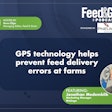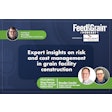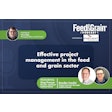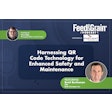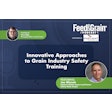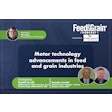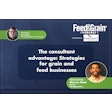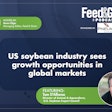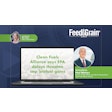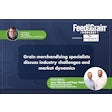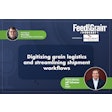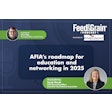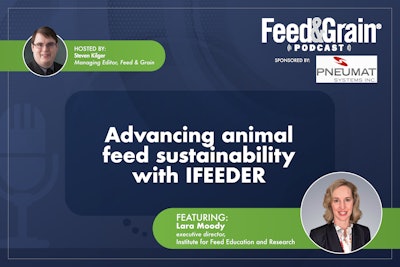
Join Steven Kilger, the host of the Feed & Grain Podcast, in a episode dedicated to exploring the advancements and challenges in sustainability within the feed manufacturing, grain handling and allied industries. This episode features an insightful conversation with Lara Moody, executive director of the Institute for Feed Education and Research (IFEEDER).
In this episode, Steven and Lara discuss the progression of IFEEDER’s sustainability roadmap, the exciting developments slated for the International Production & Processing Expo (IPPE), and ways individuals can actively engage with IFEEDER’s initiatives. Lara shares insights on IFEEDER’s recent website revamp aimed at enhancing brand visibility and offering a resource-rich platform for industry stakeholders. She delves into the intricacies of sustainability beyond the common focus on greenhouse gas emissions, addressing crucial aspects like worker safety, feed safety, and energy use.
Podcast Sponsored by Pneumat Systems.
Transcript has been edited for clarity.
Steven Kilger (0:00):
Hi everyone, my name is Steven Kilger and I'm the Managing Editor of Feed & Grain Magazine and the host of the Feed & Grain Podcast. Thank you so much for joining me today as we dive deep into the issues affecting the feed manufacturing, grain handling and allied industries.
Kilger (0:15):
Today's episode is brought to you by the BinWhip from Pneumat Systems. The powerful Dual Impact BinWhip removes the toughest buildup and blockages from industrial storage silos, without hazardous silo entry. Learn more today at BinWhip.com.
Kilger (0:31):
Today's episode is with Lara Moody, executive director for the Institute for Feed Education and Research also known as IFEEDER. We talk about how the sustainability roadmap IFEEDER putting together is progressing, what's happening at IPPE this year and how people can get more involved with the organization. I hope you enjoy the interview.
Kilger (0:50):
If you want to help out the podcast and are listening to this in a podcasting app, please rate us and subscribe. If you're listening online. Sign up for the Feed & Grain newsletter Industry Watch to see the latest podcasts and stay up to date with all the latest news from around the industry. Now on to the show.
Kilger (1:05):
Hi, Lara, thank you so much for joining me today.
Lara Moody (1:10):
Hey Steve, it's great to be on with you again ahead of this year's IPPE show.
Kilger (1:14):
It's always great to have you back. I think you're one of our most frequent guests. I always enjoy talking to you. For anyone who doesn't know you. Can you tell us a little more about yourself and what you do it at IFEEDER?
Moody (1:26):
Sure, Steve, I am the Executive Director for the Institute for Feed Education and Research otherwise known as IFEEDER. And IFEEDER is the research and education foundation that supports the American Feed Industry Association. I came to IFEEDER almost three years ago now. And it's been a lot of fun getting to know the industry. I've previously worked in the fertilizer industry and on manure management efforts in the university setting. So it's been great to learn a new industry and to work on behalf of the American Feed Industry Association.
Kilger (2:01):
So that's great. I saw that IFEEDER recently launched a new website. Can you tell me a little bit about it? Why did you guys decide to redesign and what are some of the features that visitors can expect when they go on there.
Moody (2:13):
IFEEDER is realize that there's a lot more we could be doing to increase our brand awareness and get people to notice and see what it is that IFEEDER is doing to support the feed industry. And so as part of our communications plan last year, we took on updating the website. And we did that with input from a variety of different stakeholders and industry members. And so for us, we built the new website to be a resource for stakeholders up and down the animal food value chain, who are interested in learning more about the animal feed industry's sustainability efforts. We hope that the new website will provide potential collaborators and donors with deeper visibility into our education and research efforts. So that they may choose to opt to support some some of our ongoing research initiatives.
Moody (3:03):
So we just have a real significant opportunity for additional industry members and other stakeholders to contribute to the work that IFEEDER is doing. We are after all a 501(c)(3), and we are reliant on contributions from our stakeholders. And so this website gives us a way for them to have more visibility of what we're doing, to see the types of projects that we're doing, they can more easily navigate around the website, it's mobile friendly. And then also, it now has some new features where there's like very clear places for folks to go and see what types of projects we have underway. Find the conclusions and outcomes of those projects and your resources, as well as being able to search some of our archived news releases and newsletters for a variety of great articles that they might be interested in.
Kilger (3:55):
Well, that all sounds great. I've been involved in I think it's three website redesigns. Great. And they're always a lot more work than everyone thinks. So it's a big accomplishment.
Moody (4:07):
Well, I appreciate the shout out on it. And it really was a full team effort. We had a lot of input and a lot of engagement from the AFIA team on putting that website together.
Kilger (4:20):
Yeah, it takes a village. But here's the big news is we talked about you said a little bit at the beginning of this. IPPE is almost here and that's always a huge moment for IFEEDER for us for the industry in general. And I saw that you're going to show some new resources from the Animal Feed Industries Sustainability toolkit. Yeah, that's a mouthful, isn't it?
Moody (4:43):
You can just call it the Sustainability Toolkit.
Kilger (4:47):
From this Sustainability Toolkit at IPPE this year, this is now what your third year kind of working on the sustainability roadmap and sustainability in the animal feed industry in general. Can you elaborate a little bit more on these new resources, and kind of just the project overall, if you wouldn't mind saying a few things about it.
Moody (5:07):
So you know, when I first came to IFEEDER, we knew we wanted to focus on sustainability to support the industry, both with research and with educational resources they can utilize, we first developed the sustainability roadmap, which really laid out the areas of work that needed to be pursued to be able to support the industry and that that guides the work that IFEEDER does and the sustainability space. Along with that last year, we launched the Animal Feed Industry Sustainability Toolkit, which was a compilation of resources that industry members could use to either start their journeys in the sustainability space, understand more background, or trends about what was happening in sustainability. Or even if they're already down the sustainability path, give them more resources and guidance and insights into their decision making.
Moody (5:58):
Well, we always knew that that was kind of version 1.0. So this spring, we'll be launching version 2.0, the toolkit, that's at least how I think about it in my mind. And so we've got a couple of resources that we're going to preview it IPPE. One of those I'm really excited about, is a set of materials that we developed in partnership with Iowa State University. And so in our initial work, we identified 16 issue areas relative to people planet and governance, that were determined to be important to both the animal food industry as well as our stakeholders, which really, by that I mean our customers and their customers. Within that, it's important for folks to realize that greenhouse gas emissions and carbon and climate, while that gets a lot of focus, when people talk about sustainability, there's so many other elements to sustainability to talk about. Like human capital or worker safety, or feed safety or water or energy use. And so we wanted to provide a resource that our industry could use to understand what all those other issue areas are that are relevant to sustainability for the feed industry.
Moody (7:14):
And so we've got a resource that's going to help define the value of assessing and documenting improvement for each of those issue areas. And then really exciting a set of case studies that are built on existing industry actions for the feed industry so that we could give people an idea of what we're talking about with each of those issues. So that's one resource we've got coming out.
Moody (7:37):
A second resource is going to provide insight into a pathway for quantifying the impact of feed driven performance improvements on reducing the footprint of Animal and Dairy production. So when we think about rations, there are a lot of innovations that are happening in the animal ration space that continues it has been taking place, but the development of those innovations is taking place over time. And it's going to continue to take place for the foreseeable future. And so within that, we know that that ration innovation has the ability to support the sustainability goals of our customers and our stakeholders. In other words, ration and feed ingredients are a solution to some of the sustainability goals and targets that our customers and their customers are setting.
Moody (8:26):
And so we as an industry need to be able to do a better job at quantifying so that we can document and account for those benefits. So if you think of something like how we can improve the average daily gain of an animal with a ration change, or how we can improve the feed conversion efficiency with ingredient change, all of those have the potential to reduce the amount of time and animals in a production facility or to reduce the amount of feed that we have to provide the animal to bring them to their full weight or their their full production. And so those types of improvements, translate to reduced energy in the house or reduced water in the house or reduced carbon footprint because we're not feeding as much grain. So those things are quantifiable. And our resource that we're creating is the start of mapping that out. So it's going to provide some insights into what a methodology could look like. And then over time, we'll build on and refine that methodology so that we can then move towards a calculator that we can have as an industry for that type of thing. So those are two resources I'll be talking about and take a deeper dive even into at IPPE next week. Really
Kilger (9:42):
important topics are those kinds of the key strategies, innovations that IFEEDER is advocating for in the industry. What do you see as, I don't want to call it the low hanging fruit because it's all very hard to do, but like some of the key points where you think the animal feed industry can really improve Move on sustainability.
Moody (10:01):
You know all of this stems, IFEEDER strategy, in the space stones from our sustainability roadmap and work that we did with the Feed System Sustainability Summit and other collaborators to really think about where we can, as an industry make change and the environmental footprint of animal production. And so we have different areas that we can focus on to do that from the feed stuff production side to ration innovation to circularity, which we haven't even talked about yet, and responsible sourcing. And so if IFEEDER is collectively looking at those four ways that we can help advance sustainability for the feed industry, and either pursuing research to support those areas, or education, development of educational resources to support those areas.
Moody (10:49):
So we have a variety of projects underway. They're all driven, again, by that strategic plan for that sustainability roadmap that we have, that outlines the work that we're looking to do. And for us, it's really important not only for the feed industry to recognize feed as a sustainability solution for our animal stakeholders, or customers. But it's also really important for our downstream stakeholders to recognize that feed is a part of their solution. So you know, a lot of the work that we're doing is to benefit the animal industry as to how feed can be a solution. But equally important, is our ability to engage those downstream stakeholders like a Nestle or McDonald's or Starbucks so that they understand when they've got their own goals that are set and have a linkage to feed because a big piece of their supply chain that feed ingredients themselves, we have a place at the table to be able to help them. And so it's important for us to be able to quantify that. So I would say the biggest piece of our strategy is really the ability to be able to show how fee can be a solution in those sustainability efforts that many of our customers and stakeholders have.
Kilger (12:05):
Excellent, those all sounds great. And you mentioned you're going to be speaking at IPPE, what are some of the sessions that IFEEDER is going to be involved with it IPPE this year or anything that you're just particularly excited about?
Moody (12:18):
Yeah, we've got several options where I will be on the agenda on behalf of IFEEDER. One of them. The first starting out of the gate on Tuesday morning is the Animal Ag Sustainability Summit. It's held each year in collaboration with USPOULTRY, the Meat Institute, and the American Feed Industry Association. This year we've got a great kickoff to that. So our keynote is going to be Dr. Frank Mitloehner with the clear center from UC Davis, he's going to provide insights into some of his team's research and other efforts they have underway to reduce the footprint of animal agriculture. But then each of those collaborators will have the opportunity to provide insights into their own sustainability work.
Moody (12:58):
So for me, I'll be there speaking on behalf of IFEEDER highlighting a variety of the work we have underway, some of which we haven't even talked about today, like the work we're doing on lifecycle assessments. So I'll cover the highlights and give an update on a lot of the work that IFEEDER doing at the Animal Ag Sustainability Summit.
Moody (13:17):
We also then on Wednesday morning, American Feed Industry Association is hosting symposium called Feed your ESG, which is really aimed at feed industry members getting started in the sustainability space and better understanding the environmental social governance aspects of sustainability, or I translate that to people, planet and governance. So there there are several of us that will do a dive into various ways that the industry is engaging in sustainability and what it means to the industry. And I'm actually pretty excited about sitting through the whole symposium there, not just the opportunity to speak.
Moody (13:53):
And then Wednesday afternoon, one other place that will take an opportunity to talk is that one of the TechTalks at IPPE and the TechTalk I'm giving Wednesday afternoon is the environmental footprint of feed and how we can reduce it with ingredient decisions. So if anyone's interested in learning more about that methodology and the potential we have for ration innovation as a way to reduce the environmental footprint of animal agriculture, I'm going to take a deeper dive into that project on Wednesday afternoon.
Kilger (14:21):
Oh, great. That all sounds interesting. I will probably be at that TechTalk myself. So I'm looking forward to your thoughts on it. Also, we'll have to have you on in the spring to talk a little more about some of the other initiatives that we didn't get a chance to mention here today because I think you guys are doing amazing work. And I'm always really interested to hear what you have going on. For industry members stakeholders out there. How should they go about engaging with AI feeders projects and initiatives? Where should they go to kind of find more information?
Moody (14:50):
Yeah, well, taking us right back to the top of the conversation. The new website is IFEEDER.org and on the website they can check out The various different projects that we have underway. And if you want to stay more updated on what IFEEDER's got going on, we have a monthly newsletter, there's a way to sign up for that newsletter. If you want to see if the newsletters of interest, go look through some of the past archives at the types of material we share in those newsletters. We're also always open to contributions and donations from stakeholders. So if you're interested in donating, or getting involved in a project and reach out to me, you can contact me through the IFEEDER website and the IFEEDER.org website is a great place to go for any of that information.
Kilger (15:33):
And I would encourage anyone in the industry to get involved because you know, you're doing important work and we need more people looking out for the advancement of sustainability in our industry, because it's hard to do it all yourself. Thank you so much for talking to me today. I'm really looking forward to IPPE next week and see you there.
Moody (15:51):
Thanks. I look forward to seeing you next week. Steven.
Kilger (15:55):
Thank you so much, Laura, and thank you for listening. Until next time, stay safe






